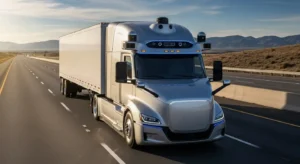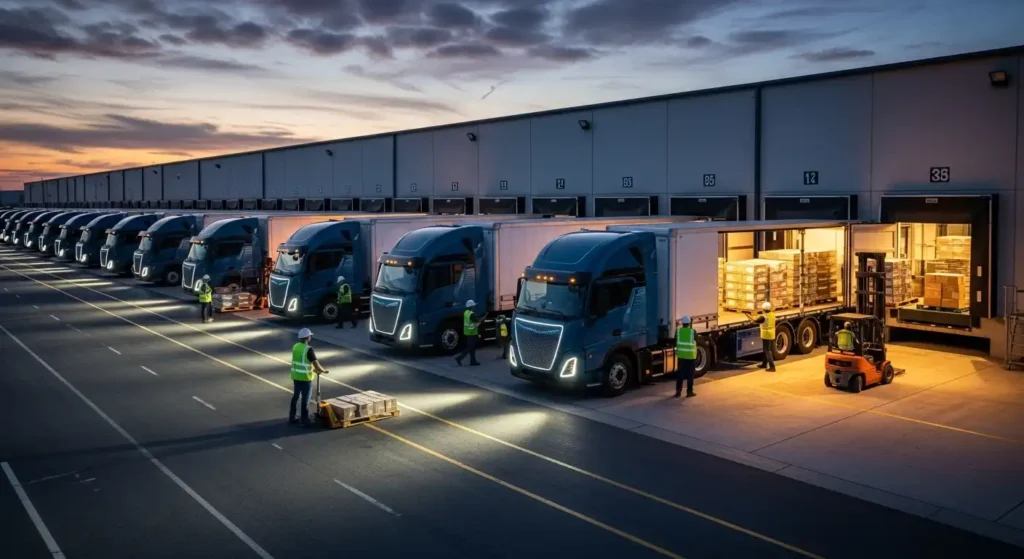Introduction
The trucking industry has long been a backbone of global commerce, responsible for transporting goods across vast distances. However, the environmental impact of diesel-powered trucks has become a growing concern. In response, electric trucks (EV trucks) are emerging as a revolutionary solution for reducing emissions and driving sustainability in freight transportation. These vehicles not only help reduce the carbon footprint of the freight industry but also promise significant operational savings in terms of fuel and maintenance.
In this article, we will explore the evolution of electric trucks, the benefits they offer, the challenges they face, and what the future holds for this rapidly developing technology.
The Rise of Electric Trucks
 Electric trucks have been around for some time, but recent advancements in battery technology, government incentives, and environmental policies have accelerated their development and deployment. Companies like Tesla, Volvo, Daimler, and Rivian are at the forefront of electric truck innovation. Tesla’s Semi, for instance, boasts a range of up to 500 miles on a single charge, while Volvo’s VNR Electric truck is designed for regional operations, offering a sustainable solution for city-based freight transport.
Electric trucks have been around for some time, but recent advancements in battery technology, government incentives, and environmental policies have accelerated their development and deployment. Companies like Tesla, Volvo, Daimler, and Rivian are at the forefront of electric truck innovation. Tesla’s Semi, for instance, boasts a range of up to 500 miles on a single charge, while Volvo’s VNR Electric truck is designed for regional operations, offering a sustainable solution for city-based freight transport.
Electric trucks are part of a larger shift toward decarbonizing the transportation sector, which is one of the largest contributors to greenhouse gas emissions worldwide. With the global push to achieve net-zero emissions by 2050, the freight industry is under increasing pressure to adopt cleaner technologies, and electric trucks provide a viable path toward that goal.
Benefits of Electric Trucks
1. Environmental Impact: Reducing Carbon Emissions
One of the most significant advantages of electric trucks is their ability to reduce carbon emissions. Unlike diesel trucks, which emit harmful pollutants such as nitrogen oxides (NOx) and particulate matter, electric trucks produce zero tailpipe emissions. By adopting electric trucks, companies can contribute to cleaner air, lower greenhouse gas emissions, and better public health.
2. Cost Savings: Lower Operating Costs
Electric trucks are not just good for the environment; they are also cost-effective. Although the upfront cost of an electric truck can be higher than that of a diesel truck, the long-term savings are significant. Electric vehicles (EVs) require less maintenance because they have fewer moving parts compared to traditional internal combustion engine trucks. Additionally, the cost of electricity to power EV trucks is significantly lower than the cost of diesel fuel, providing companies with reduced fuel expenses over time.
3. Noise Reduction: A Quieter Fleet
Another benefit of electric trucks is the reduction in noise pollution. Electric vehicles operate much more quietly than their diesel counterparts, which is especially beneficial in urban areas where noise from trucks can be disruptive. This makes electric trucks ideal for night-time deliveries or operating in residential areas where noise levels must be kept to a minimum.
4. Government Incentives and Support
Governments around the world are offering incentives to encourage the adoption of electric trucks. These incentives include tax credits, grants, and rebates to offset the higher initial cost of electric trucks. Additionally, many countries are investing in charging infrastructure to ensure that electric trucks have the necessary support to operate efficiently.
Challenges of Electric Trucks
1. Charging Infrastructure
 One of the main challenges facing the widespread adoption of electric trucks is the lack of sufficient charging infrastructure. While electric vehicles have become common in passenger cars, the charging infrastructure for commercial trucks remains underdeveloped. Charging stations for electric trucks need to be strategically located along key freight routes, and they must offer fast-charging capabilities to minimize downtime for drivers.
One of the main challenges facing the widespread adoption of electric trucks is the lack of sufficient charging infrastructure. While electric vehicles have become common in passenger cars, the charging infrastructure for commercial trucks remains underdeveloped. Charging stations for electric trucks need to be strategically located along key freight routes, and they must offer fast-charging capabilities to minimize downtime for drivers.
2. Range Limitations
Despite significant improvements in battery technology, the range of electric trucks is still limited compared to their diesel counterparts. While many electric trucks offer a range of around 250 to 500 miles on a single charge, this can be a constraint for long-haul trucking operations. Companies will need to invest in larger and more efficient batteries or develop better charging networks to support long-distance travel.
3. High Initial Costs
While operating costs for electric trucks are lower, the initial purchase price is still a significant barrier. Electric trucks require expensive batteries, which contribute to their higher upfront cost. Although the cost of EV trucks is expected to decrease as battery prices continue to fall, it remains a challenge for small and medium-sized trucking companies to make the transition.
The Future of Electric Trucks
Despite the challenges, the future of electric trucks is bright. Several key trends are expected to shape the next decade of electric freight transportation:
- Improved Battery Technology: As battery technology continues to advance, we can expect electric trucks with longer ranges and shorter charging times.
- Expanded Charging Networks: Investment in charging infrastructure will grow, making it easier for electric trucks to operate on long-haul routes.
- Autonomous Electric Trucks: The integration of autonomous driving technology with electric trucks could further reduce costs and improve safety, leading to more efficient freight transport.
- Government Regulations: Governments will likely implement stricter emissions regulations, which will encourage companies to adopt electric trucks to meet compliance requirements.
As the technology continues to evolve, electric trucks are set to become a cornerstone of sustainable freight transportation. Their widespread adoption will help reduce the environmental impact of the logistics industry while also providing companies with cost savings and operational efficiencies.

